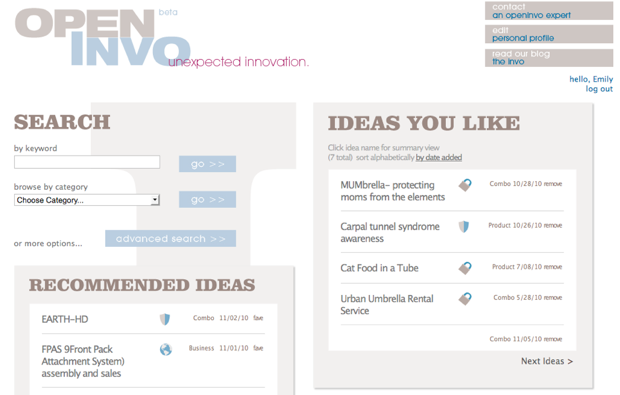 Have a great idea, but don’t have the time or money to actually bring it to market? A new startup called OpenInvo wants to help you turn it into a nice chunk of change by selling it to existing businesses that are looking for an extra dose of innovation.
Have a great idea, but don’t have the time or money to actually bring it to market? A new startup called OpenInvo wants to help you turn it into a nice chunk of change by selling it to existing businesses that are looking for an extra dose of innovation.
Now, there are other platforms for sharing business ideas — you may be familiar with Kickstarter, which has gotten attention for projects like the iPod Wristwatch. But Kickstarter is for people who want to bring their ideas to fruition and just need funding — OpenInvo is for people who have an idea and are willing to put the time in to flesh it out on paper, but don’t want to have to deal with actually starting a company.
For most users, the setup is pretty simple: you log into the site, agree to a fairly lengthy legal document, and then outline your ideas using diagrams and other supplementary material as necessary.
Established businesses eager for some outside inspiration can then come along and browse through OpenInvo’s directory of ideas (after paying for access, of course). At this point the tools for browsing this directory are still fairly nascent, but founder Emily Lutzker says that the company plans to build it out once it raises additional capital.
So how much can you expect to make should a business decide it likes one of your ideas? This varies a lot — Lutzker says that the service gauges a variety of factors, like the potential market size, how much work you’ve put into fleshing out your idea, and whether or not there’s an existing relevant patent in order to establish a fair price. But she says the range could be anywhere from $5,000 to $100,000. There’s also an option for the idea creator to collect a percentage of revenues generated by the idea, though the purchasing business would obviously have to agree to those terms.
There are a lot of IP issues involved here, and Lutzker says that the site has been vetted by lawyers to make sure that things are up to snuff. New idea submitters have to agree to an online contract indicating that they accept OpenInvo’s terms, and companies that wish to browse the ideas have to sign a contract of their own. To help prevent abuse (for example, companies simply taking ideas without paying their creators), OpenInvo tracks each page that a business visits.
OpenInvo is still in a very early state. Lutzker says that the service has some large companies who are eager to browse through the site’s directory, but that the service is waiting for the marketplace to fill out with more submissions before it opens the floodgates to these ‘Idea Seekers’. If those submissions don’t come then the service is obviously in trouble, so it’s doing what it can to get the word out.
In the future, OpenInvo will also flesh out its collaboration tools, and it will eventually offer real-time brainstorming sessions that businesses can use as online focus tests.
There are plenty of other online platforms for sharing ideas, including Kickstarter and Quirky. The latter has its community vote on submitted ideas, and it brings them to market with the original creator getting a cut of the proceeds. There’s also Innocentive, which sets out to solve ‘problems that really matter’.

